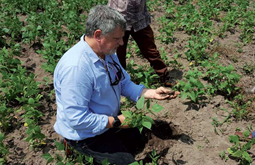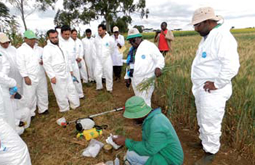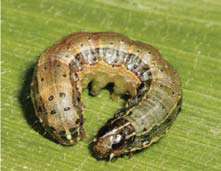Climate Change Could Mean Beer Shortage
Shortages On Tap
As the impact of climate change on food staples becomes more apparent, scientists with the International Maize and Wheat Improvement Center (CIMMYT) are beginning to study how increasing temperatures will affect other contributors to the human diet. A new study indicates that the global beer supply will be hard hit. Given how seemingly plentiful beer is, this is difficult news to hear.
The study, “Decreases in global beer supply due to extreme drought and heat,” was simply “born out of a love for beer and the fear of its potential scarcity,” says Wei Xiong, a senior scientist at the CIMMYT and a key contributor to the research.
Two years ago, Xiong and the other scientists began to design the study to learn more about extreme drought and heat patterns adversely affecting crops around the world. Barley, the primary cereal grain from which beer is brewed, is one of the most heat-sensitive crops, meaning that even short periods of high temperatures can affect grain quality and grain yield.
Despite a number of studies published assessing yield loss of barley and other crops due to global warming, there were no previous studies published connecting the price of beer to barley yield. The study, which the scientists refer to as the “drinking security” project, has garnered world-wide interest from various media outlets given the popularity of beer.
Read more ...
To Feed the World, Take the Science to the Farmer
 Hundreds of food and agriculture leaders from around the world gathered in Iowa, USA, for the 2018 edition of the Borlaug Dialogue. Much of the conversation this year was centered on how to “take it to the farmer,” as Norman Borlaug famously said. Experts discussed how to build sustainable seed systems, grounded on solid science, so improved varieties reach smallholder farmers.
Hundreds of food and agriculture leaders from around the world gathered in Iowa, USA, for the 2018 edition of the Borlaug Dialogue. Much of the conversation this year was centered on how to “take it to the farmer,” as Norman Borlaug famously said. Experts discussed how to build sustainable seed systems, grounded on solid science, so improved varieties reach smallholder farmers.
Louise Sperling, senior technical advisor at Catholic Relief Services, presented a study on the sources of seed for smallholder farmers in Africa. She explained that 52.2 percent of households receive new varieties, but only 2.8 percent of the seed comes through agro-dealers. The biggest source is local markets and own stock, the so-called informal channels.
Quality and variety of seed should be the focus, emphasized Jean Claude Rubyogo, seed systems specialist at CIAT. In his view, we need to integrate formal and informal seed distribution channels, using the competitive advantages of each.
“When we take good seed, we address all African soil,” said Ruth Oniang’o, board chair at the Sasakawa Africa Foundation. Oniang’o explained access to financing is a major hurdle for smallholders to access better seed and other innovations. In her view, current financial products are inadequate. “Why should we get a farmer to pay 20 percent interest rates on a small loan?”
Read more ...
 The International Maize and Wheat Improvement Center (CIMMYT), in collaboration with Kenya Agricultural & Livestock Research Organization (KALRO) and Cornell University, recently trained 29 scientists from 13 countries on wheat rust disease diagnosis and management techniques, as well as innovative wheat breeding practices. The training, part of the Delivering Genetic Gains in Wheat (DGGW) project, took place at the KALRO research station in Njoro, Kenya, where CIMMYT’s wheat breeding and rust screening facility is located.
The International Maize and Wheat Improvement Center (CIMMYT), in collaboration with Kenya Agricultural & Livestock Research Organization (KALRO) and Cornell University, recently trained 29 scientists from 13 countries on wheat rust disease diagnosis and management techniques, as well as innovative wheat breeding practices. The training, part of the Delivering Genetic Gains in Wheat (DGGW) project, took place at the KALRO research station in Njoro, Kenya, where CIMMYT’s wheat breeding and rust screening facility is located. Smallholder farmers in sub-Saharan Africa lose up to a third of their grain after harvest because they often use poor grain storage technologies and ineffective drying practices. Staples like maize stored on-farm are exposed to infestation by insects and fungi. These can lead to contamination with mycotoxins, in particular aflatoxins, poisonous food toxins produced by Aspergillus fungi.
Smallholder farmers in sub-Saharan Africa lose up to a third of their grain after harvest because they often use poor grain storage technologies and ineffective drying practices. Staples like maize stored on-farm are exposed to infestation by insects and fungi. These can lead to contamination with mycotoxins, in particular aflatoxins, poisonous food toxins produced by Aspergillus fungi. African farmers have lost millions of dollars in earnings since 2016 due to the loss of crops to the voracious fall armyworm.
African farmers have lost millions of dollars in earnings since 2016 due to the loss of crops to the voracious fall armyworm. Hundreds of food and agriculture leaders from around the world gathered in Iowa, USA, for the 2018 edition of the Borlaug Dialogue. Much of the conversation this year was centered on how to “take it to the farmer,” as Norman Borlaug famously said. Experts discussed how to build sustainable seed systems, grounded on solid science, so improved varieties reach smallholder farmers.
Hundreds of food and agriculture leaders from around the world gathered in Iowa, USA, for the 2018 edition of the Borlaug Dialogue. Much of the conversation this year was centered on how to “take it to the farmer,” as Norman Borlaug famously said. Experts discussed how to build sustainable seed systems, grounded on solid science, so improved varieties reach smallholder farmers.